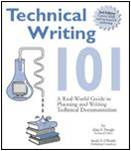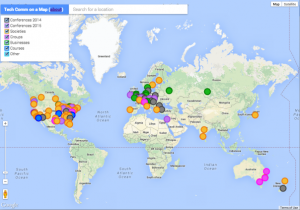As the World Turns, So Does Our ‘Beat’
Posted on September 29, 2015
Filed Under Communication, Technology, The Writing Life | Leave a Comment
A technical writer named Rebecca muses on the web about her choices of employment – and her freedom to make them. That, as we know, is one of the benefits of being a “lone wolf” technical writer.
“My long-term goal in becoming a technical communicator,” Rebecca writes, “is to be an outsourced employee, but without a larger ‘umbrella’ company sending me my W-2’s each year. I want to dictate the companies I work for and have some control over the projects I accept. I am comfortable putting on that ‘company’s uniform’ for a temporary time and then moving on.”
Rebecca quotes R. Stanley Dicks in Digital Literacy for Technical Communication: “Many more technical communicators will be officially unemployed but constantly working. They will be following the consulting/temp agency model that already characterizes the work of many communicators.”
Speaking for herself, Rebecca adds that “I am hoping to open a fortune cookie with just that prediction for my future: “You will soon find yourself unemployed, but always working.”
That’s not a paradox, it’s the work of a consultant, which many technical writers, including Encore’s Dennis Owen, actually are. Their roles are well-suited to an increasingly digital economy in a continuing state of emergence.
Dennis has been something of a pioneer in technical consulting, working in jobs where he’s been needed and can make important contributions, but not working these past few decades in a job. And the varied experiences he has had as a result have been invaluable.
Rebecca expresses something of the same sense of fulfillment: “The technical writing program I was set to enter was very solid and respected. But in 2001, it wasn’t very focused on digital media. Within a few short years, their ‘technical writing’ program became their ‘Technical Communications’ program. It was completely revamped several times over the next few years, as they slowly began to focus the program more on the emerging use of technology.
“Had I enrolled back in 2001,” Rebecca adds, “I would have been ‘getting to the party a little too early’.”
So roll with the opportunities as they arise in a steadily changing world. Like anyone else, actually, that’s what observant technical writers ought to be mindful of in these challenging times. It’s sort of like a newsman’s ‘beat’. – Doug Bedell
When to Pause to ‘Get It Down’?
Posted on September 18, 2015
Filed Under Communication, Technology, The Writing Life | Leave a Comment
Jim Grey on his Stories From the Software Salt Mines site makes a clearcut distinction that’s worth stamping into one’s awareness: “Personal computers are for content creators; mobile devices are for content consumers.” Or, creators – think desktop; consumers – think mobile.
 Makes pretty obvious sense – up to a point that seems to be approaching with increasing speed. The continuing development of iPads and other mobile devices tempts us to use them for creating content, not just reading or viewing it. (Apple says that, come November, its newest iPad will have an external keyboard available.)
Makes pretty obvious sense – up to a point that seems to be approaching with increasing speed. The continuing development of iPads and other mobile devices tempts us to use them for creating content, not just reading or viewing it. (Apple says that, come November, its newest iPad will have an external keyboard available.)
Technical writers likely are paying increasing attention to these distinctions, or to their increasing tendency to blur together. It would be nice to create serviceable copy wherever you have the ability to pause a bit, not only at your desktop, but, say, in the park. Your insights might well be sharper and your writing fresher. Using a mobile device is like having your brain more readily at hand, providing your fingers have ready access to what you’re thinking.
Mobile devices as “mere” displays allow us to take advantage of idle time. Jim Grey notes that “an Internet device in our pocket lets us pleasantly wile away the minutes we spend waiting — in doctors’ waiting rooms, before meetings begin, in the john.” But he’s not going to start blog posting on his phone.
Unless, we’d venture, Jim or any of us finds ourselves in a situation where it would be advantageous to get our thoughts down coherently because they’re especially important to us or maybe to others.
You see what’s happening here? The modes of expression are tending to merge with the availabilty of technology that can help that happen. Reflections that used to be random meditations can now be recorded musings – if and when we feel they’re significant enough. This can help make us more observant, as well as more reflective, and that’s all to the good, most of the time.
Remember the title of Jim Grey’s blog – “Stories from the Software Salt Mines.” We don’t want to feel that we’re living in a salt mine, just that we have the ability to use a mental pick and shovel when they’re occasionally advisable – for the record, say. Maybe we’d even get more sleep some nights. – Doug Bedell
Progress Promptings From a Roller Coaster
Posted on August 31, 2015
Filed Under Business, Communication, Technology, The Writing Life | Leave a Comment
One of the truly liberating aspects of a talent like technical writing is the ability to function with minimal support and oversight. That’s the setting you’re likely to find at a start-up company, so don’t overlook the advantages of working for a beckoning startup.
Tom Johnson, of I’d Rather Be Writing, asks: “What qualities should technical writers have to work at startups?” He answers by listing: Technical aptitude, Independence and leadership, Content strategy skills, Versatility and Stability.
Stability? Aside from coming to work each day at an agreed time, what’s that mean in terms of successful technical writing?
 “To ride the roller coaster of a startup,” Tom explains, “you need to have stability in your career, knowing that if your job dries up you can find another, or that you have savings to cover a period of unemployment during the transition, or that you can handle any changes and continue with the company, perhaps in another role entirely (e.g., support or training manager).”
“To ride the roller coaster of a startup,” Tom explains, “you need to have stability in your career, knowing that if your job dries up you can find another, or that you have savings to cover a period of unemployment during the transition, or that you can handle any changes and continue with the company, perhaps in another role entirely (e.g., support or training manager).”
Actually, as we discovered at a trip to our local, continually-evolving amusement park recently, the roller coaster was among the milder of the thrill rides. You’ve got to be prepared for anything that fate or fortune throw at you these days.
Underlying ability, interest and fortitude still contribute the most to your ability to keep your seat when things get turbulent which, at some point, they most likely will. Close your eyes (for a moment), hold on, circulate, observe and write well. Keep your hands on the car, not up in the air, as the non-achievers tend to do.
Okay, they’re just doing that out of exuberance (or maybe in defiance of fear). But it’s not exuberance that keeps you safely employed at today’s workplaces, or on behalf of today’s clients. It’s ability, vision and diligence. – Doug Bedell
A Ballerina’s Take on Her Technically Demanding Craft
Posted on August 17, 2015
Filed Under Education, The Writing Life | Leave a Comment
Technical writing comes in many forms, dance being one of them. There, good technical writing – instruction in ballet moves, for example – can be life-changing. Beth Bluett de Baudistel, a long-time Australian ballerina and dance teacher, reminisces about her international career in the Sunshine Coast Daily in Queensland.
 As an 18-year-old ballet soloist, Beth would would write evenings in her diary, half a world away from her family, “all the amazing technical concepts I had been learning. Little did I know that this would be the foundation of writing a dance curriculum like no other.
As an 18-year-old ballet soloist, Beth would would write evenings in her diary, half a world away from her family, “all the amazing technical concepts I had been learning. Little did I know that this would be the foundation of writing a dance curriculum like no other.
“Exercises based on how a student could sense the centrelink of the body from quite a young age – it had never been documented.”
Her dance curriculum was rated a success “because it is giving the world of dance a way to train with excellence without the propensity to injury that other methods have.
“Innovative ideas come in seed form, and seeds have to be nurtured to grow,” Beth says.
“I like the phrase ‘do not discount small beginnings’.
“If you feel it is worthwhile, keep at it.”
These are words befitting the experience of technical writers in all sorts of arenas. They’re born of experience and close attention to detail with the enthusiasm of a participant observer who wants to share with others how to do something challenging safely.
Beth Bluett de Baudistel reminds us that conveying any complex information can properly be called technical writing if it is done to teach and inform. – Doug Bedell
Moreover, Writing Takes Time to Do Well
Posted on June 9, 2015
Filed Under Communication, Government, Technology, The Writing Life | Leave a Comment
Here’s Tom Johnson, the technical writer proprietor of “I’d Rather Be Writing,” trying to make amends – and offer cautions – for all our heedless brethren who aren’t so mindful that, after all, they’re dealing with human readers, even if they may have technical mindsets.
 Readers turn to a technical text to learn efficiently. But, too often, they’re imposed upon by writers who don’t take the time to be readily understood. Yes, coherent technical writing takes time, along with an understanding of its context.
Readers turn to a technical text to learn efficiently. But, too often, they’re imposed upon by writers who don’t take the time to be readily understood. Yes, coherent technical writing takes time, along with an understanding of its context.
The first thing we need to do, Tom notes, is to “decode complexity”. But if complexity is presented well, it can take less time to cope with – good technical writers take the time to save their readers time. (Their employers need to be mindful of that.)
Densely driven technical writers are prey to the main hazard of all heedless writers – they risk not being readily understood. Who would sit down to a keyboard these days and not want to be readily understood? Only reckless or inordinately pressurized souls. Be sure you own situation is fairly structured to allow you to read and write well. (Clue: Communication with managers may be required.)
Yet you also have to apply shoe leather. Part of being a good technical writer, Tom notes, is being an investigative reporter. You need to seek out information from its sources – the actual “doers” in your work setting.
“I set about asking engineers around me for information,” he writes. “Every time I talked to an engineer, I would get a firehose of useful information that would help me understand what was going on.” You’re there, basically, to slow down and aim the hose so that others don’t get sprayed with information.
Tom suggests that stepping through a task yourself, if you have the time, is a good idea – and you should have the time. (Again, supervisors please take note.)
And finally, the best advice: “Rest your brain. Sometimes,” Tom notes, “when I can’t figure something out, I sleep on it. In the morning, the answer comes to me.” Or simply take a break.” Indeed, a good cook will tell you that recipes can’t be rushed. Technical writing’s no different. – Doug Bedell
Writing That Gets You From Here to There – Now as Then
Posted on May 11, 2015
Filed Under Communication, Technology, The Writing Life | Leave a Comment
Tom Johnson, a technical writer in San Jose, CA, has the right idea: He wants to be sure that technical writing is focused on the reader (that is, the user), not the equipment or processes being explained. They’re obviously important, but the reader is moreso. He or she has got to get it right – and readily so.
 Tom has started a new series on his I’d Rather Be Writing blog on user-centered design. That’s what all good writing should be: user-, that is, reader-, centered. It’s not the equipment or location that’s benefitting from clarity of expression – except residually (it can be damaged) – but the reader who’s seeking to use it properly. And he or she may be in too much of a hurry.
Tom has started a new series on his I’d Rather Be Writing blog on user-centered design. That’s what all good writing should be: user-, that is, reader-, centered. It’s not the equipment or location that’s benefitting from clarity of expression – except residually (it can be damaged) – but the reader who’s seeking to use it properly. And he or she may be in too much of a hurry.
All good writing puts the reader foremost. Not that writing needs to be overly simplified, but it needs to be engaging – or, in the case of technical writing, readily decipherable.
Tom Johnson has spent some time in usability labs watching users interact with his content and, he says, “it’s an eye-opening experience.” He’s got some links in his post relating to the labs, but he’s distilled 12 patterns from them. They include recognizing that users are often in a hurry, that they like visuals and that they don’t necessarily read in sequential order.
Meeting such human desires is indeed a challenge to technical writers, but those are your publics – human beings under pressures.
Tom Johnston writes not not so much about instructions for physical products as software documentation, which is his gig. Yet clarity applies as much to today’s cyber settings as it did to Thomas Hardy’s Wessex novels.
Tom Johnson urges his tech writing colleagues to design their documentation around his perceived patterns of user behavior. In listing them, he’s done a lot of your work for you. Take advantage of his accomplishments. – Doug Bedell
(Illustration: Simon Gatrell’s book “Thomas Hardy’s Vision of Wessex”)
Good Writing Requires Empathy Always
Posted on April 22, 2015
Filed Under Technology, The Writing Life | Leave a Comment

The craft of writing, technical or otherwise, is a demanding one – surely you’ve heard that?
Stephen Pinker, Johnstone Professor of Psychology at Harvard University and chairman of the Usage Panel of the American Heritage Dictionary, discusses that reality in a Wall Street Journal post. Only he attributes the difficulty to the wrong source, or at least doesn’t go deeply enough into the problem.
It’s not so much that writing is so much a demanding exercise as a somewhat deluding one. You’ve gotten those words onto paper, they flow before your eyes, so they must be the delightful outcome of a trying process. Oh, really?
The difficulty in writing well – so that your output isn’t opaque or appear as next-to-gibberish to someone else – is that you, the writer, may be lacking in a sense of empathy. Relax, that’s not fatal, but it takes awareness to correct. Empathy is best defined as walking in someone else’s shoes or, in this case, reading with someone else’s eyes. How am I coming across not to myself, but to my readers, should be every writer’s question, constantly.
Forget the recognition you may have justly earned for your accomplishments. When a page with your words on it is put before someone else, all that matters at that moment, besides the basic accuracy of your expression, is how well it connects with the reader, how well it informs or inspires others.
Pinker discusses bad writing in terms of the “bamboozlement theory” of written expression. “Pseudo intellectuals,” poor writers who consider themselves good ones, let themselves off the hook too easily – if they even realize that they’re on a hook.
“The curse of knowledge,” he writes, “is the single best explanation of why good people write bad prose. It simply doesn’t occur to the writer that her readers don’t know what she knows – that they haven’t mastered the argot of her guild, can’t divine the missing steps that seem too obvious to mention, have no way to visualize a scene that to her is as clear as day. And so the writer doesn’t bother to explain the jargon, or spell out the logic, or supply the necessary detail.”
In other words, he or she (sex doesn’t matter when prideful creation is underway) doesn’t empathize enough with the reader. “How am I coming across?,” “Am I being understood about what I’m trying to get across?” should be his or her recurring thought.
Walk in another’s shoes while writing and you may get to a different place than you intended, but you’ll have others with you. And it’s always great to have company, real companions, not simply assumed ones. – Doug Bedell
Technical Writing’s For Real, Steph
Posted on April 9, 2015
Filed Under Communication, The Writing Life | Leave a Comment
We were browsing for an Insights post and came upon Technical Writing World, an interesting-looking “social network for technical communicators”. Yet, there it was, in the very latest post, by one Steph Hepner to Lia Pi, apparently a member of a college class somewhere:
“Hi, this is my experience. I didn’t watch my grammar or composition, so please don’t think I’m a bad tech writer – I was just lazy and in a hurry! You may contact me if you have any questions or I answered yours incorrectly…”
 Well, thank you, Steph, for the antithesis of good technical writing. We learn sometimes, don’t we, by going to extremes? Well. the extreme for good, orderly technical writing is 1) Being lazy, 2) Being in a hurry and 3) Leaving the reader guessing, puzzled or confused.
Well, thank you, Steph, for the antithesis of good technical writing. We learn sometimes, don’t we, by going to extremes? Well. the extreme for good, orderly technical writing is 1) Being lazy, 2) Being in a hurry and 3) Leaving the reader guessing, puzzled or confused.
You couldn’t boil the craft down to a more succinct core than that.
Maybe technical writing, though, doesn’t belong on a gossipy, we’d presume, social network like this one. Yet Technical Writing World appears to be devoted to the craft itself. Or, maybe we’re missing the difference between conversation and a craft. To be kindly, we’d allow that that’s what occurred here.
The trouble is that technical writing is pretty demanding, even in its “social mode”. What if, under pressure, a technical writer should lapse into his or her social media guise? That wouldn’t be good for him, her, the craft, or the enterprise involved, would it? Or is there a difference between the standing of the craft and given practitioners thereof? We’d hope not.
The heart of what we’re trying to suggest is that good writing is a discipline, one that’s practiced whenever fingers touch upon a keyboard. Suppose a concert pianist began doodling “in public,” which, after all, is what writing on a social network amounts to – conversing in written form in public.
No, Steph, we don’t think you’re necessarily a bad technical writer, just a reckless one when it comes to communicating outside your cubicle. Or were you in yours when you wrote this post? If so, shame. You don’t need to be stuffy, just careful, orderly and certainly not in a hurry. – Doug Bedell
A Tech Writer’s Requirements: Curiosity and Clarity
Posted on March 10, 2015
Filed Under Communication, Technology, The Writing Life | Leave a Comment
 It can be argued that technical writing is a higher form of writing than other types of written expression. Or if not a “higher” mode, than a more demanding one, in that there can be prompt physical consequences to technical jottings. Technical writing provides directions for acting in physical space – it needs to be clear and accurate.
It can be argued that technical writing is a higher form of writing than other types of written expression. Or if not a “higher” mode, than a more demanding one, in that there can be prompt physical consequences to technical jottings. Technical writing provides directions for acting in physical space – it needs to be clear and accurate.
Instructional materials are consulted with a presumption of expertise and diligence on the writer’s part. And yet, what goes into assuring that directions and procedures are accurate and useful? What are a good technical writer’s most important traits, his or her most essential operative values?
Technical proficiency is needed, but it may not be enough. Sharon Burton, a veteran California technical writer, feels that curiosity, plain and simple, is a key requirement. “I can teach someone to write,” she says. “What I can’t teach is the curiosity to ask questions, to poke at the product, to constantly ask ‘What if…?'” Indeed, whatever it is that makes something functional (and, of course, safe) is of key importance. There’s no mistaking that.
Once you’re confident about the scope of a process, and are ready to put it into words, clarity and economy of expression are required. At Encore Technical Resources, proprietor Dennis Owen feels that a technical writer’s most important trait is “to thoroughly understand a process, so that you can write about it in a logical sequence. It needs to be a well-written, intelligible path to be followed.”
Curiosity and clarity – two values central to good technical writing. We try hard to make them Encore’s hallmarks. Unlike the often fleeting satisfaction that comes with completing a gripping work of fiction, technical writing can have immediate and lasting consequences. They need to be the ones intended by the writer from the start, the fully predictable results of all that’s been invested in his, or her, craft. – Doug Bedell
Touring World Technical Writing Sites
Posted on January 13, 2015
Filed Under The Writing Life | Leave a Comment
 Wow! Want to know what’s going on in the world of technical writing by locale? We’ve come upon Sarah Maddox’s “Tech Comm on a Map” interactive GitHub page, Technical Communication on a Map. It’s got color-coded, click-on locations for technical communication Conferences, Societies, Groups, Businesses, Courses and, even, “Other” locations for tech com activities around the world. You can turn the categories on or off to get a clearer view of any given activity in the crowded world technical writing community.
Wow! Want to know what’s going on in the world of technical writing by locale? We’ve come upon Sarah Maddox’s “Tech Comm on a Map” interactive GitHub page, Technical Communication on a Map. It’s got color-coded, click-on locations for technical communication Conferences, Societies, Groups, Businesses, Courses and, even, “Other” locations for tech com activities around the world. You can turn the categories on or off to get a clearer view of any given activity in the crowded world technical writing community.
This is the kind of enterprising service that makes fraternity possible, whether in technical writing or any other activity. Thank you Sarah! We’re about to embark on a tour of your locales, worldwide. A great service!
Sarah does the ffeathers “technical writing and fiction” blog. Now there’s a combination!
« go back — keep looking »Recently
- Presentations With Forethought
- Technical Writing’s Lineage – Surely It’s Deeper than Digital
- At the Holidays, Twitting Amazon
- Successful Cookie Baking – From Mom, an Acknowledged Expert
- Slides for a Tech Writer’s Craft
- Digital or Not, Be Clear
- Being Watchful About Digital Designs…
- When Proposals Don’t Click, Keep Making Them Anyway
- Like a Good Gardener, Help an Enterprise Keep Itself Current
- We’re Leaders All, And Need to Think That Way
Categories
Archives
- January 2017
- December 2016
- November 2016
- October 2016
- September 2016
- August 2016
- July 2016
- June 2016
- May 2016
- April 2016
- March 2016
- February 2016
- January 2016
- December 2015
- November 2015
- October 2015
- September 2015
- August 2015
- July 2015
- June 2015
- May 2015
- April 2015
- March 2015
- February 2015
- January 2015
- December 2014
- November 2014
- October 2014
- March 2014
- February 2014
- January 2014
- December 2013
- November 2013
- October 2013
- September 2013
- August 2013
- July 2013
- June 2013
- May 2013
- April 2013
- March 2013
- February 2013
- January 2013
- December 2012
- November 2012
- October 2012
- September 2012
- August 2012
- July 2012
- June 2012
- May 2012
- April 2012
- March 2012
- February 2012
- January 2012
- December 2011
- November 2011
- October 2011
- September 2011
- August 2011
- July 2011
- June 2011
- May 2011
- April 2011
- March 2011
- February 2011
- January 2011
- December 2010
- November 2010
- October 2010
- September 2010
- August 2010
- July 2010
- June 2010
- May 2010
- April 2010
- March 2010
- February 2010
- January 2010
